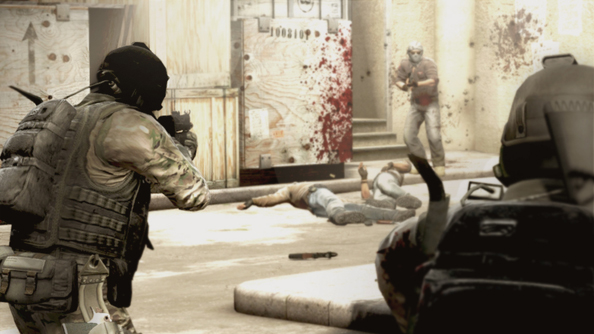Loot boxes have now saturated videogames to such an extent that it is undeniable that they are here to stay. But is that a problem or a boon? Exactly how predatory the practices associated with microtransactions – and therefore loot boxes – are is an issue still up for debate. So let’s have one.
Overwatch’s cosmetic-only loot boxes aren’t as innocent as they seem.
Just one more go
A common question surrounding loot boxes is whether or not they constitute gambling. In short, it is complicated. In many cases, the answer depends on the game in question, the prizes up for grabs, and even the person you speak to. But whatever your personal opinion on the matter, the issue is an urgent one – loot boxes have been discussed by governments and gambling commissions across Europe and America. The relative cost of microtransactions also seems to be growing: Hearthstone expansions cost hundreds of dollars to unlock in their entirety; the full spread of Star Wars Battlefront II’s content was initially locked behind thousands of hours of play, or a total cost of more than $2,000; even something as simple as Clicker Heroes has had players spend “thousands” on microtransactions.
No matter what side of the ‘loot boxes as gambling’ debate you fall on, the boxes themselves are loaded with aspects that appeal to us on a psychological level, gently tickling the pleasure centres of our brains to encourage us to return. The first, and most basic, of those is that human beings derive satisfaction from unexpected pleasures.
Luther Patenge, who used to create loot boxes for mobile developers Kabam, says “every time you open a loot box, your situation is getting better, but it’s getting better in unexpected ways, so that hits all the little cheap instant dopamine buttons.” Those same dopamine hits are what encouraged our ancestors to keep foraging for berries, and what keep us scrolling through Facebook or Reddit looking for the next amusing post, whatever it may be – it is not the content that keeps us going, so much as a desire to see something new.
.jpg)
This idea is found in another central aspect of loot boxes. Patenge alludes to the economic ideals of William R. Allen, who in 1982 stated that economics is not driven by need, but by want. That “the assertion of absolute economic ‘need’ – in contrast to desire, preference, and demand – is nonsense.”
In other words, as Patenge puts it, “we misjudge what we actually want. People don’t want things, people want acquisition, the constant feeling that you’re getting somewhere.” That sense of want, rather than need, is prevalent in videogames in general, and has been since the earliest roleplaying games – “you can see that in level-up systems,” Patenge continues, “the continuous prevalence of RPG mechanics is a sign that people like that feeling of having started at the bottom.”
Pay for the privilege
That sense of progression can easily carry over into the real world. It is one thing to have an impressive armour set in a game like The Witcher 3, but that is something only you can see and appreciate. Mark Johnson, a postdoctoral Fellow at the University of Alberta studying game studies and sociology – and also an independent game developer – says that part of what loot boxes offer is a sense of social status that may be out of the reach of some players.
He looks to games like World of Warcraft, Eve Online, and Halo 3 – which existed before microtransactions and loot boxes really took off – and how they offered special armours and ship designs that could only be obtained through a feat of skill. Johnson points out that not everyone had the required skill to earn these kinds of cosmetic rewards and so they acquired a kind of social status – a symbol of a person’s ability. “When the game is based around skill, or hard work, or both, at playing the game, of course you can give out some rewards for that,” but that means some people who want to earn those rewards will never be able to get them. That forms a desire for these cosmetics that some players are willing to put money behind.
 As a result of this, games have since developed two different “tracks of status,” one based on skill, and the other based either on luck or how much players are willing to pay for a certain item. Johnson likens this second track of status to owning designer clothes or a flashy car in real life – this form of status is not inherently linked to personal worth in the form of aptitude or intelligence, but “it will get you in with some crowds and not with others.”
As a result of this, games have since developed two different “tracks of status,” one based on skill, and the other based either on luck or how much players are willing to pay for a certain item. Johnson likens this second track of status to owning designer clothes or a flashy car in real life – this form of status is not inherently linked to personal worth in the form of aptitude or intelligence, but “it will get you in with some crowds and not with others.”
Similarly, being Diamond rank in League of Legends comes with a certain level of kudos, but so does owning a Legendary skin, even though you can simply buy the latter for a (relatively) small fee. Chasing after this form of status is, for some, a way in which players have been encouraged over time to accept the inclusion of cosmetic microtransactions, particularly in free-to-play games.
Catching up with greed
The growing prevalence of loot boxes and microtransactions is obviously not the fault of players alone. When I spoke to Luther he gave me a list of ‘best practices’ that he employed in his designs. They included, among others, making sure players are not being overcharged for their prizes – if a loot box costs a certain amount of premium currency, the prizes it gives out should be worth that much as a minimum. At the very least, that practice would prevent the classification of the box as gambling.
Mark Griffiths, director of the International Gaming Research Unit at Nottingham Trent University, agrees, saying loot boxes do not constitute gambling “if the prize is something of value and is equal to or exceeded the price paid.” Unfortunately, many games don’t follow such guidelines. Johnson suggests that the reason for that is what he refers to as “technological somnambulism.” He elaborates: “We’ve kind of wandered into loot boxes and microtransactions, and there’s been very little public debate about how this works.”
Johnson cites Battlefront II as an example where a major developer “hasn’t really thought through all that much how this would be received by the public.” Johnson suggests that EA let “the genie out of the bottle,” and caused the outside world to take notice of the practice for the first time. He says that while there is “a definite corporate greed element,” there is also “an aspect of just not really thinking through critically what the effect on gamers or the wider community [will be]”.
 Patenge seems to back up the idea that loot boxes are the result of observation rather than manipulation. He maintains that the reason they have become so common is that many designers of his generation grew up playing Magic: The Gathering. But he also asserts that the basic psychology that loot boxes appeal to has been prevalent for much longer.
Patenge seems to back up the idea that loot boxes are the result of observation rather than manipulation. He maintains that the reason they have become so common is that many designers of his generation grew up playing Magic: The Gathering. But he also asserts that the basic psychology that loot boxes appeal to has been prevalent for much longer.
“It starts with baseball cards,” he says. From there we get to Magic cards, then the digital adaptation of Japanese gachapon machines, which brings us up to loot boxes – “you don’t need to employ a psychologist,” Patenge adds, “you can just follow industry trends.”
Get out of my head
Whether there is a psychological element to loot box design or not, the impact it may have on vulnerable players is difficult to ascertain. However outdated the notion, the people most often identified as a key gaming demographic are young men, while those identified as a key gambling demographic are elderly men and women. As a result, research into the vulnerability of young men – not least young women – to practices associated with gambling is, thus far, limited.
Not only is there minimal academic research on this topic, but, according to Griffiths, the sheer number of ways to gamble and play videogames means that the two fields are too expansive to definitively tie together. Johnson, meanwhile, suggests that people gamble every day in a variety of ways, from pitting our time and effort on the outcome of a job application to bankers spending millions effectively wagering on the outcome of the stock market.
“Loot boxes are a new kind of wagering within games,” Johnson says, “and should be looked at differently to other kinds of wagering within games. But it’s still within a broad spectrum of commonality.” His suggestion is that the social acceptance of one form of wagering in games does not make another inherently harmless or dangerous – they are separate practices and should be treated as such.
 As for who, if anyone, loot boxes are directly targeting, it is even more difficult to tell. Griffiths says that if your decision to gamble is based on who you are as a person, so too is your choice in videogame – “those who are sensation seekers and like games that involve risk taking would be more susceptible to gambling that those who aren’t,” he suggests, before qualifying that those people are not more inherently at risk than anyone else.
As for who, if anyone, loot boxes are directly targeting, it is even more difficult to tell. Griffiths says that if your decision to gamble is based on who you are as a person, so too is your choice in videogame – “those who are sensation seekers and like games that involve risk taking would be more susceptible to gambling that those who aren’t,” he suggests, before qualifying that those people are not more inherently at risk than anyone else.
Patenge, meanwhile, says he has seen addiction take many forms, but that “anyone can be interested in loot boxes, as long as you are interested in the contents.” He also notes that addiction, when attached to videogames, is not limited to gambling. When we spoke again after our initial discussion, he told me that he takes issue with the idea that loot boxes inherently constitute gambling.
Whether loot boxes exploit gamblers or create them is perhaps a question that is simpler to answer than we might expect, however. Johnson says that “videogame spaces in general are spaces which definitely encourage kinds of play [that] encourage people to gamble.”
 In a game of League of Legends or Counter-Strike, for example, no matter how you play you are still wagering your time and effort against the outcome of the match. For most of us, at least, any flashy or praiseworthy plays are often down to as much luck as judgement. As Johnson says, “these are ‘winner-take-all’ spaces, and if you can’t win by skill, maybe you can win by luck.”
In a game of League of Legends or Counter-Strike, for example, no matter how you play you are still wagering your time and effort against the outcome of the match. For most of us, at least, any flashy or praiseworthy plays are often down to as much luck as judgement. As Johnson says, “these are ‘winner-take-all’ spaces, and if you can’t win by skill, maybe you can win by luck.”
Based on current evidence, the reality appears to be that those mechanisms within games that could be perceived as gambling are not, for the most part, explicitly designed to exploit existing gamblers, or to turn people into them. Rather, the aim behind these loot boxes is to catch as many players in the net as possible. Developers are not aiming for anyone in particular – those who are likely to spend more and often, for example – but to simply hoover up as much extra revenue as they can without inciting a backlash. As Johnson says,“everyone is in some way susceptible to the allure of loot boxes and gambling in general, both because humans like to take risks, and want to get something for nothing.” It could be argued that certain companies have pushed these concepts too far in recent years, of course. But whatever the case, it is clear that more research is needed to determine what is safe, what is acceptable, and ultimately what the repercussions of the industry’s dopamine gold-rush might be.
